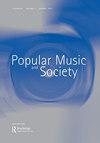“Go Out and Bring Me Lazarus”: O Brother, Allegory, and a Work Song’s Circuitous Journey
IF 1.3
3区 艺术学
0 MUSIC
引用次数: 0
Abstract
ABSTRACT Sung by convicts and recorded in 1959 at Mississippi’s Parchman Farm penitentiary, the work song “Po Lazarus” keynoted 2000ʹs award-winning soundtrack O Brother, Where Art Thou? and, thus recontextualized, helped spark a folk revival. Like its protagonist, “Po Lazarus” has been “messed with” – captured, preserved, aestheticized, commercialized. It’s also been allegorized: explicitly by African-American ministers and implicitly by the soundtrack, which limns the circular journey of high Romanticism, a trope originating with Plotinus and Augustine. Moreover, the soundtrack evokes the Manichean allegory of European colonialism, working to simultaneously critique and reproduce the racialized imaginary of Southern vernacular culture.“出去给我带来拉撒路”:哦,兄弟,寓言和一首工作歌曲的迂回之旅
《拉撒路》由囚犯演唱,于1959年在密西西比州的帕奇曼农场监狱录制,作为2000年获奖配乐《兄弟,你在哪里?》的主题曲。因此,重新定位,帮助激发了民间复兴。和它的主角一样,《拉撒路宝》也被“搅乱”了——被捕获、被保存、被美化、被商业化。它也被寓言化了:由非裔美国牧师明确表达,由配乐含蓄地表达,描绘了高度浪漫主义的循环之旅,这种比喻起源于普罗提诺和奥古斯丁。此外,配乐唤起了摩尼教对欧洲殖民主义的寓言,同时批判和再现了南方本土文化的种族化想象。
本文章由计算机程序翻译,如有差异,请以英文原文为准。
求助全文
约1分钟内获得全文
求助全文
来源期刊

POPULAR MUSIC AND SOCIETY
MUSIC-
CiteScore
1.10
自引率
0.00%
发文量
33
期刊介绍:
Popular Music and Society, founded in 1971, publishes articles, book reviews, and audio reviews on popular music of any genre, time period, or geographic location. Popular Music and Society is open to all scholarly orientations toward popular music, including (but not limited to) historical, theoretical, critical, sociological, and cultural approaches. The terms "popular" and "society" are broadly defined to accommodate a wide range of articles on the subject. Recent and forthcoming Special Issue topics include: Digital Music Delivery, Cover Songs, the Music Monopoly, Jazz, and the Kinks. Popular Music and Society is published five times per year and is a peer-reviewed academic journal supported by an international editorial board.
 求助内容:
求助内容: 应助结果提醒方式:
应助结果提醒方式:


